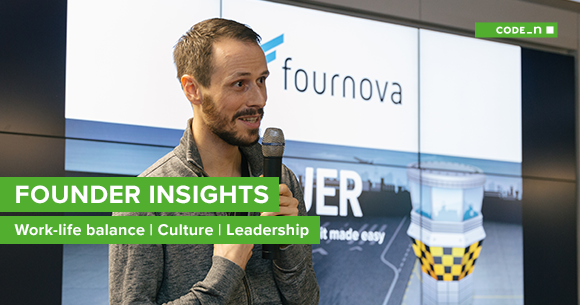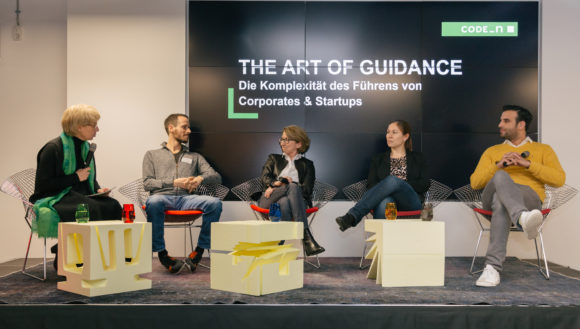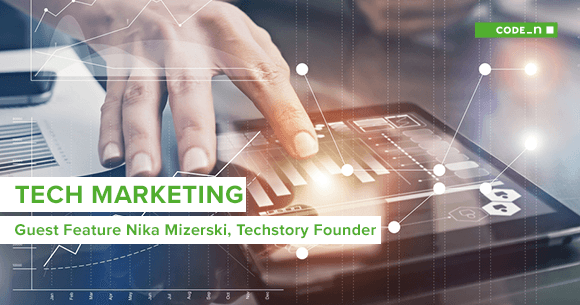Tech founder Tobias Günther: "A balanced lifestyle is crucial for your long-term success"
At the CODE_n event “The Art of Guidance – The Complexity of Leading Corporations and Startups”, Tobias Günther shared some pearls of wisdom from his life as a tech founder (fournova Software). How do you lead a remote team? How do you create a unique culture in your own company that the employees feel part of? Tobias spoke about his first-hand experiences in his presentation and also recommended a leadership style that is modest and which regards colleagues as competent partners. Today, we are speaking to him about how the topics of founding a company and stress management are related, and what he does to maintain the right balance despite many challenges. Teaser: That’s where mindfulness comes into play. Once again, we have a number of valuable tips and a wealth of inspiration to share with you!

Lisa: Hi Tobias. Could you give our readers a quick summary of your startup? When did you start out, and how large have you become in the meantime?
Tobias: In 2010, we started working on our own product “Tower” (www.git-tower.com) – a tool for software developers working with the popular Git version control system. Today, it’s used by over 80,000 people in companies all over the world like Apple, Google, Amazon, and Salesforce. We’re a fully remote team of 8 people, living in different parts of Germany.
Lisa: What experiences did you have as a founder with workload while you were setting up your own startup?
Tobias: The first 2-3 years were indeed quite demanding: I remember at least one or more weekends spent in the office and some long hours. I think that a high workload is simply inevitable during the first couple of years when starting your own company. This is totally normal and simply part of building a company. It is crucial, however, that this does not become a permanent state!
Lisa: Do you think that, as a founder, you can achieve a work-life balance? If so, what are your tips for other founders? And if not, why not?
Tobias: You definitely can. And, maybe more importantly: you have to! The alternative of constantly overstraining yourself is simply not sustainable. This means that it’s not only in your own best interest to lead a balanced life, but it’s also critical for the long-term success of your company.
For me, personally, two aspects are critical:
First: I try to keep a very a strict schedule. I rarely work after 5 pm – and I never work in the evenings or on the weekends (anymore). I try to finish each workday with a small dose of exercise or simply a walk around the block. This lets my brain know that we’re done for today.
Second: The often-quoted wisdom that “work is not everything”. A merely theoretical understanding, however, won’t get you far. I think it’s only by making experiences outside of work (no matter if it’s relationships, travel, arts, spirituality, sports, other hobbies) that you get a chance to realize this. Work is part of life, not life itself.
Lisa: You also trained to become a mindfulness trainer. What took you down that path, and what experiences have you been able to take away with you?
Tobias: It’s the classic tale of a personal crisis: After experiencing a “burnout” a couple of years ago, I slowly began to understand that I needed a different way of looking at life. Meditation and mindfulness indeed provide this different, deeper view for me. And since it fascinated (and still fascinates) me so much, I decided to learn more about it by attending a teacher training course on these topics.
Of course, this is not something that is restricted to my personal life: It dramatically changed the way I treat and interact with my teammates.

The art of guidance: expert panel with Tobias (second from left) on the complexity of leading corporations and startups held on February 21, 2017 at CODE_n SPACES.
Lisa: At the CODE_n event in February, you passed on your experiences of managing remote teams and offers insights into your attitude towards culture and leadership. What do you feel are the most important points in these areas for the setup and management of a (remote) team to achieve long-term success?
Tobias: Working remotely offers countless advantages – but there are also a couple of pitfalls:
- Not everybody can work remotely. As a remote worker, you must be able to build and maintain a stable work routine on your own. You have to make sure you begin and end your workday at sensible hours.
- Communication is paramount. Every member of a remote team must be able to write well and clearly, because writing (e-mails, instant messages, wikis, etc.) is one of the main forms of interaction in a remote team.
- Culture doesn’t “happen” anymore. When you’re working in a shared office, a lot of your company culture simply happens – by meeting at the water cooler or grabbing a beer after work. In a remote team, you have to consciously create culture.
Lisa: What are the next steps with fournova?
Tobias: From a product perspective, we’ll make sure that Tower remains the best Git tool for Mac and Windows – and maybe start a new product someday.
From a company perspective, we want to keep building an extraordinary company culture – where people respect each other, where great work is valued, and where work and life are not mutually exclusive.
Lisa: Thank you for this frank interview, Tobias.
We will be reporting more on the subject of “How founders handle an intensive workload” in the near future, and we’ll also be looking at what the healthtech sector involves.





Comments